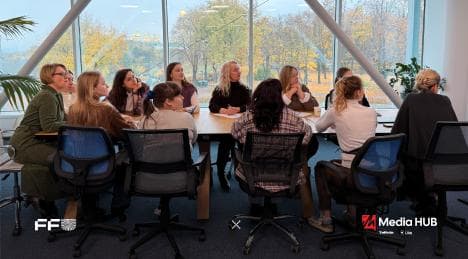On October 6, a press conference was held in Kyiv on the topic: “What does a woman who is waiting keep silent about? Indefinite loss.” The difficulties a woman goes through, what she feels, and most importantly, how to help her were the questions that became central during the press conference organized by the Future for Ukraine Foundation.
“Almost two years ago, we launched the GIDNA project in the area of indefinite loss. After all, women need not only social and economic support, but also psychological help. This has become a new chapter in our work,” says Olena Nikolaienko, president of FFU in the US.
Over the past year, the GIDNA project’s specialists have held 180 therapy sessions. However, the need for such help is only growing: in the first nine months of 2025, the team has already held 550 consultations and still has a waiting list.
“We started a pilot project working with the daughters, mothers, and sisters of Azovstal defenders. We helped 14 women and expanded our work to include everyone who contacts the project,” comments Anna Hrubaia, head of the GIDNA project.
The main message of the conference was that women should not be left with their pain. Seeking psychological help is not shameful; it is a sign of self-care and a way to restore your resources so that you can continue to believe and wait.
“There is a stigma in society, kind of “No one will help me, no one needs me with this grief, I will go through it alone’. And when women come to us, we see the amount of work that needs to be done. We see constant tension stored in the body. The first stage of our work is to stabilize the woman's condition, normalize her emotions, and rebuild her internal support system, because it is simply absent," commented on the project's psychologist, Natalia Prysiazhniuk.
Representatives of the Association of Families of Territorial Defense Forces of Ukraine “Women TRO”, as part of the NGO “Women’s Family” — Olena Skytiuk and Iryna Maryshkina — joined the discussion. They know from their own experience what it means to live through an indefinite loss.
Olena, mother of a missing defender: “We live between hope and pain, between the silence of the phone and the belief that tomorrow we will receive news. An indefinite loss is a distinctive kind of pain; it has no end and no beginning. That is why both human and psychological support are crucial.”
Iryna, whose husband disappeared almost two years ago, adds: “Every woman should understand that men return from captivity in terrible condition, and they need support and a strong backside, with strong women waiting for them here. If a woman does not maintain strength, she won’t be able to help anyone. At all.”
Ukrainians who have gone missing or are being held in captivity are not just a problem for some families, who live in silence 24 hours per day. An important step in this direction was taken by Serhiy Korshikov (an actor at the Kyiv Academic Theater of Drama and Comedy on the Left Bank of the Dnipro, a serviceman of the Armed Forces of Ukraine) with his project “Your Letters.”
“Psychologists advise writing such letters when there is no one else to turn to, but there is a need to do so. They remain somewhere in a drawer, but in fact, they are important for everyone. Even for defenders, it is a sign that there is a home front, that there are people who will always wait for them, love them, and believe in them,” says Serhii.
“We are offered to the women who are waiting for the closest to write letters. Then we expanded the project, approached the theater, and asked the actors to read the letters and bring them to life,” adds Oleksiy Dmytrashkivsky, colonel and head of communications for the Armed Forces of Ukraine.
"In fact, letters have therapeutic power. We can avoid emotions, and this mechanism works quite well. However, the body remembers everything, so it is essential to express these emotions: to talk, share feelings, and write. When we write a therapeutic letter, we ask questions that we haven't asked, we share our experiences, and when we write on behalf of a loved one, we can obtain those answers. This doesn't solve the problem, but it helps to live through the situation the woman is in," comments Anna Hrubaia.
Furthermore, the psychologist emphasizes that we can only heal through contact with other people. That is why therapy is so important.
Please fill out the form at gidna.org or contact us by phone: +38 (050) 722-89-13 to receive psychological help.



